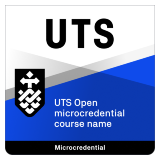This microcredential has been designed to provide you with an applied introduction to the field of data analytics, and an orientation to its different usages. It has been designed by the UTS Faculty of Engineering and Information Technology, leveraging the Faculty's unique expertise in the area of artificial intelligence.
In this course you will meet and work with a dedicated course facilitator, who supports your learning and engagement with the teaching resources designed by the Lead Academic and a team of experts in the Faculty of Engineering and Information Technology.
There are six modules, each featuring self-study materials and facilitated online sessions.
1. Decision trees
In this module, you will cover supervised and unsupervised machine learning, the classification and prediction process, decision trees and entropy and information gain.
2. Evaluating classifiers
In this module, you will learn how to evaluate a classifier through studying the confusion matrix and related measures, ROC curves and bias and variance decomposition.
3. K-NN algorithm
In this module, you are introduced to another classification and regression method. Throughout this module, you also will learn how to validate the outcomes of your models and will be introduced to some key concepts in the training of a model.
4. Ensemble methods and random forest
An ensemble method is a learning algorithm that consolidates several machine learning models into one model. This approach constructs the decisions by training multiple classifiers and then classifies new data points by taking a vote of each of the classifier predictions. By pooling the predictions of multiple machine learning algorithms, the outcome is generally a better prediction than using a single algorithm.
5. Support vector machines
In this module, you will learn about kernel methods and Support Vector Machines (SVMs). To understand the concept of an SVM, you first need to know some other basic terms which will be covered in this module.
6. Neural networks
In this module, you will be introduced to the concept of neural networks, their history and types and training algorithms of neural networks.
Scheduling
This course is delivered in a scheduled format over ten weeks.
Each week (during weeks 1 to 8) you will participate in an online session where you will have the chance to apply what you've learned, ask questions and hear from other participants who are taking the course with you. The workshops are led by the course facilitator.
Weeks nine and ten are planned to give you time to complete the final assignment, with support and scheduled Q&A sessions available.
Course delivery
This microcredential includes weekly, live, one-hour online workshops facilitated by an expert UTS academic supporting self-study and online learning activities. Case studies of real-world business operations will be used to illustrate applications of data mining techniques.
The workshop sessions focus on hands-on experience in data mining and data analytics tools, and the understanding and interpretation of the results. Regular formative quizzes throughout the microcredential will allow participants to gauge their progress.

















